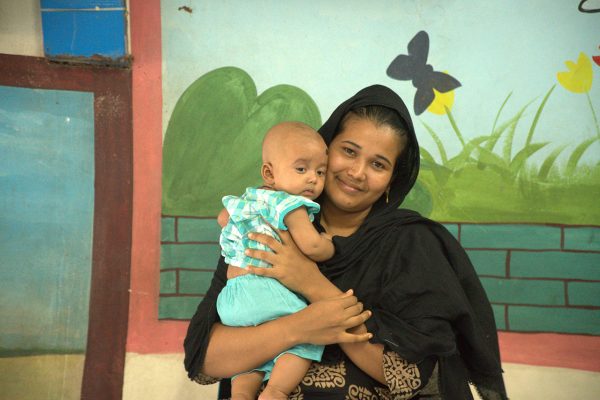Reading Time: 3 minutes
Sierra Leone should reconsider its law barring pregnant girls from completing their education, but while the law is in place, alternatives are available
Sierra Leone should reconsider its law barring pregnant girls from completing their education, but while the law is in place, alternatives are available

Girls learning in Brac’s Empowerment and Livelihood’s programme in Sierra Leone. Photograph: Anton Shevchenko/BRAC
The government of Sierra Leone issued a ruling last month barring “visibly pregnant” girls from attending class or even sitting for school equivalency exams, a decision that drew criticism from girls’ rights groups. While groups like Brac and others continue to advocate for the right of all girls to attend school, we can also draw attention to alternatives that allow girls who drop out, for whatever reason, to continue their education.
“This is a baffling policy,” says Chernor Bah, a Sierra Leonean children’s rights advocate and an associate at the Population Council. “The government says that having pregnant girls in school might have a negative influence on other girls. Show me one girl who saw a pregnant girl and said, ‘I’d like to get pregnant too.’ And in any case, basic education is a right to all, full stop.”
Others have joined the call to reconsider the ruling. “The ruling in Sierra Leone concerns us,” says Philippa Lei, advocacy director of the Malala Fund, the organisation co-founded by 2014 Nobel-peace-prize laureate Malala Yousafzai. “The Malala Fund is calling on all governments to provide at least 12 years of education free to every child. Their child-bearing or marital status is immaterial.”
Brac shares in the concern. Along with other programmes, the organisation currently runs a network of girls’ empowerment clubs reaching 5,700 Sierra Leonean girls in 200 villages, where researchers from MIT’s Poverty Action Lab are examining the impact on girls’ lives.
The question for like-minded groups is whether to advocate for immediate repeal of the government’s decision or develop alternatives like these that allow pregnant girls to continue education on a separate track. “We cannot create an underclass or treat pregnant girls as a scourge that needs to be kept away,” says Bah.
But we need not support the ruling to pursue alternatives. In Tanzania, pregnant girls have faced similar prohibitions; in fact, all drop-outs are barred from returning to school. Brac has therefore begun targeting dropouts with study clubs, which are safe spaces close to the home where girls receiving tutoring and life skills training. If an evaluation of the pilot shows successful results, we may try that approach elsewhere, including Sierra Leone.
Radio-based education worked well for Sierra Leonean girls during the Ebola crisis. Brac’s network of girls’ empowerment clubs turned into places for primary school students to gather around radios broadcasting the government curriculum while schools were closed. “Some of our sisters got pregnant and won’t be able to go back to school,” says Munda Rogers, 17, one of the peer mentors in charge of an adolescent club. “The radio schools must continue so they can keep learning through their pregnancy.” It is not yet clear if the government intends to do so.
We should have the flexibility to work around cultural and legal barriers to girls’ schooling. In March, at the World Affairs Council in San Francisco, Brac’s founder, Sir Fazle Hasan Abed, reflected on the organisation’s experience in Afghanistan, where it has managed to put 200,000 girls through school. “What we did was find a culturally appropriate way of teaching girls,” says Abed. “If girls were accompanied by an older woman who brought them back home safely, even the Taliban seemed to accept that. It was a little additional cost, but it was more effective. I hope that the next generation of girls – when these girls are mothers, their children – won’t need chaperoning at all.”
The ruling against pregnant girls attending school is indeed unjust, but while outsiders can show solidarity, effective change will only come from within Sierra Leone. Regardless of what we think of the restrictions, let’s keep girls’ options open in the meantime.
Originally published in The Guardian on 11 May 2015.
Scott MacMillan is a senior writer and communications specialist at BRAC USA.





